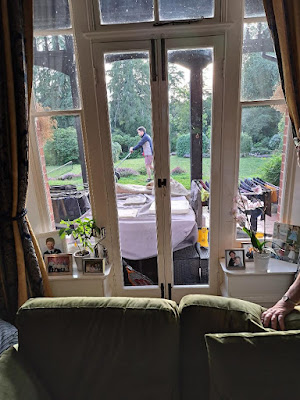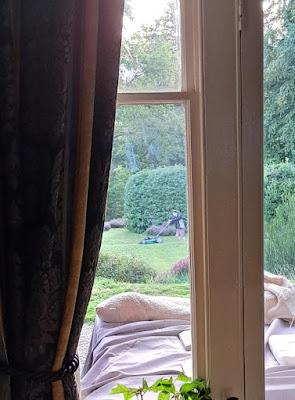11:30 Phew - well, Lois and I made it here to our daughter Alison's house in Hampshire over the 120 mile journey from our home in Malvern. It's the third time we've done this drive (and home again) in less than a month, and it always takes between 2.5 and 3 hours, depending on the traffic. And I suppose it's good for me at age 77 to keep up my driving, but I always feel totally exhausted mentally by the end of it. I'm getting old, no doubt about that [You've already told us your age for the 100th time! - Ed].
Lois helps enormously, as a second pair of eyes, and she's got a much better memory for places than me, and she often remembers exactly where we turn left or right as the case may be, whereas I depend 100% on the Google Maps voice - oh dear!
[That's enough maps of this route! - Ed]
When we arrive, Alison's family are all doing different things, as usual - they're a very modern family! Alison is there to welcome us, but Ed, Alison's husband, is shut away in his office, working from home on his hotshot legal advice job for one of the UK's big railway companies. Josie (16) is out somewhere on her 5-day lifeguard training course, Isaac (13) is preparing for his maths tutorial on zoom and later for his soccer training session. Rosalind (15) is just "chilling", however, so we can chat to her and Ali, which is nice!
Over lunch we break the news to Ed about the "red wall" of rain that's on its way from Gloucestershire arriving tomorrow morning, and he decides to do some mowing this afternoon. Their house, built for one of Queen Victoria's Vice-Admirals has massive grounds - 6.5 acres, and it's almost a full time job just keeping the garden from becoming a jungle. My goodness, yes!
the weather-forecast for tomorrow morning - yikes !!!!!
The Vice-Admiral himself, John Parish, never mowed a single blade of grass, I think it's safe to say. He and his wife employed a full-time live-in gardener, cook and maid, not to mention other staff that lived "off-piste", and came along during the daytime.
Later, as we relax on the sofa with a cup of tea, Lois and I can watch, through the family room's tall Victorian windows, as Ed gets to work outside with his powerful lawn-mower.
20:00 Lois and I relax for bed by watching another programme in Michael Portillo's series "Great American Railroad Adventures".
On this leg of his journey, Michael visits Minneapolis and St Paul.
We hear about J.J. Hill, the railroad tycoon, who, unusually, didn't build his railroads on property acquired and provided for that purpose by the Federal Government - he was determined to buy for himself almost all the land he needed for his railroads, so he could make whatever decisions he wanted without consulting the Government.
His agents then advertised in Britain and Northern Europe for settler families to come over and buy, and develop, land along the route of his railroad.
If you look at that second advertisement above, you'll see that it's in Swedish. And here's a tip for you for free - "
och" is always a good give-away that something is in Swedish: it's just the Swedish word for "and".
We used to have a word like that in English back in crazy, far-off medieval times - "eke" - but it dropped out of use in this sense, although I don't know exactly when. Perhaps it stopped being popular when people started saying "Eek!" as an expression of alarm or horror, I'm not sure, but perhaps I should be told. We still use it in the verb "to eke out", in the sense of making something last longer.
Later in tonight's programme, we see Michael visiting the museum of the American Swedish Institute in South Minneapolis, and talking to the Institute's current president, Bruce Karstadt.
We hear that Swedish settlement in the US peaked between 1860 and 1910. Astonishingly, about 20% of Sweden's population of 5 million moved overseas, mainly to North America, at this time, mostly farmers.
And they brought their love of traditional Swedish food with them, on recipe cards etc together with their traditional Swedish cooking utensils. Favourite dishes included meatballs, rye bread and "lutefisk" - reconstituted dried cod. And Swedish-Americans continue to honour the old traditions by having lutefisk at Christmas time.
Of course Michael wants to "try his hand" at preparing some "lutefisk", but Lois and I breathe a sigh of relief when it turns out that his help isn't needed. If only people would be so frank with him every time he offers to "have a go", but sadly this only happens once in a blue moon, which is a pity!
Phew! And later Michael at least gets the chance to help a little bit by carry some plates out to a table of 13 hungry Swedish-Americans waiting outside, who want to have a bit of lutefisk, even though it's summer, which is nice.
Lutefisk is usually served with boiled potatoes and either a butter or a cream sauce.
Michael himself tries to get away with having mostly cream, but the resident Swedish cuisine specialist catches him out.
Poor Michael !!!!!! But they all finish off with by a few glasses of Swedish Aquavit, a Swedish song and a group of fiddlers playing the songs that Swedish maidens used to sing to their cows, so that's all right then!
Nice end to the evening, and we're sure that these Swedish-Americans will be going to bed in a good mood, and so do Lois and I, which is nice!
22:00 Vi går och lägger oss / we go to bed - zzzzzzzz !!!!!!






























No comments:
Post a Comment